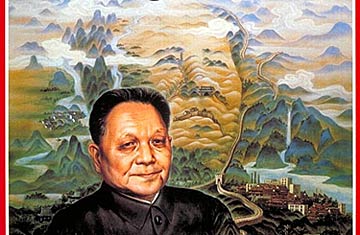
(4 of 20)
Most of all, Mao is gone. It is as if the city had been sponged of him and his "personality cult." The giant 40-foot-high portrait still hangs above the vermilion Tiananmen. But he now rests silent under a scarlet coverlet in the colonnaded mausoleum that dominates the great square.
People still talk about him — endlessly — and when they talk something peels off their normal guarded conversation. They talk of his glory years of triumph, the nightmare years of his horror, of the change that happened in this man who changed their lives, whom they both revile and revere to this day. When one talks to those who knew Mao personally, one comes across an exquisite perplexity as they try to untangle the revolution from the man who made it, the hero of the revolution from the villain who brought it to cataclysm. Those who attended him during his glory days and in his madness wonder what caused the devilish change in him, as well as when it took place.
There is the pathological view. He was, say those who studied the matter, suffering for years from Alzheimer's disease, a brain disorder leading to premature senility. Mao, some say, began to suffer a series of tiny strokes in 1959; others put the date at 1961. Slowly changing in personality, Mao would more and more receive visitors in his bedroom — a sloven's room, the bed strewn with books, leaflets, reports. Cordoned off from the world, he became the prisoner of his palace entourage, of his wife and of the Shanghailanders who, with Jiang Qing, formed the Gang of Four. "In the old days in Yanan," said one friend, "he would listen first, then talk. Now he talked but would not listen." At the end he would mumble and grunt, interpreters had to bend close to Mao's lips to strain sense from the mumbling. But, by then, all those once close to him had been killed or exiled from his inner court. Jiang Qing transmitted his orders.
What remained constant in Mao was his iron will, the invincible conviction of his own righteousness. Political analysts harp on two words: "speed" and "struggle." Mao had acquired the lust for speed in the last year of the revolution. In the fall of 1948 the commander in chief of his Manchurian strike forces, Marshal Lin Biao, had seized the key city of Shenyang (Mukden); but so many of Chiang Kai-shek's combat divisions were still at large in Manchuria that Lin Biao preferred to move with caution. Mao overruled him. Strike for the escape ports of Manchuria, he said, now. Cut them off. Field success vindicated him. Cut Peking off from Tianjin, Mao next commanded. And he was right. Strike next south of the Yellow River. There, in the famous Huai-Hai battle, half a million of Chiang's troops were captured or came over. On Oct. 1, 1949, less than a year from the seizure of Shenyang to the collapse of all resistance, Mao proclaimed the People's Republic of China. Now, more speed!
To the impulse for speed was added the driving force of "struggle." In Yanan (see box), where the clean dry air is intoxicating and the heavens are close enough to touch, "struggle" had become doctrine. Nothing was impossible if his will could drive his people to "struggle against the mountains."
But the flatlands of central China, the wet
